Introduction
As urban populations grow, so does the challenge of efficient fire response in congested zones, smart city infrastructures, and informal settlements (slums). Traditional fire trucks often struggle with access delays, leading to preventable damage and loss.
To tackle this, Fire Fighting Bikes have emerged as a compact, fast-response solution — gaining popularity in modern emergency planning across India and globally.
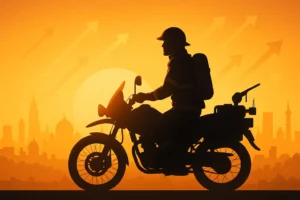
In this guide, we’ll explore:
- How fire bikes are integrating into smart city ecosystems
- Their effectiveness in high-risk slum areas
- And the must-have features of a high-performance fire bike
Smart Cities & Fire Bikes: A Perfect Fit?
With India pushing 100+ Smart City Projects, safety solutions need to be:
- Tech-enabled
- Scalable
- Quick to deploy
- Low maintenance
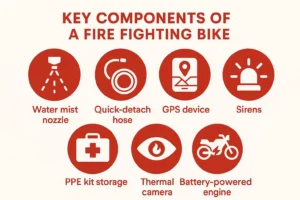
How Fire Bikes Integrate with Smart City Systems:
| Smart City Element | Integration With Fire Bike |
| IoT & Sensors | Fire bikes can be fitted with IoT temperature sensors, live alerts, and thermal imaging. |
| GIS-Based Dispatch | Real-time location data ensures the bike reaches incidents via optimal routes. |
| Public Safety Nodes | Bikes can be assigned to predefined risk zones (markets, temples, malls). |
| EV Infrastructure | Battery-operated fire bikes can charge at public EV stations — zero emissions, zero delays. |
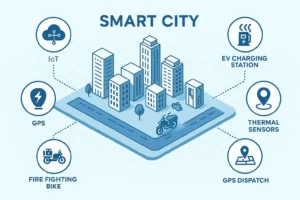
Effectiveness of Fire Bikes in Slum Areas
Slum areas pose three major firefighting challenges:
- Extremely narrow lanes
- Illegal or informal housing blocking access
Low fire safety awareness among residents
Why Fire Bikes Work So Well:
- Navigate tight lanes: Can reach where fire trucks simply cannot
- Rapid water mist suppression: Prevents small fires from becoming uncontrollable
- On-ground visibility: Fire bike teams educate, manage crowd control, and do early evacuations
24×7 patrolling: Bikes stationed nearby can prevent escalation through early intervention
In cities like Mumbai & Ahmedabad, fire bikes have shown up to 50% faster response time in congested localities.
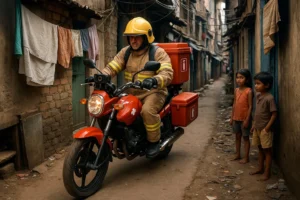
Must-Have Features in a High-Performance Fire Bike
Whether you’re a municipal planner, industrial safety officer, or tender authority, here’s what to look for:
| Feature | Why It Matters |
| Water Mist/FOG System | High-pressure mist suppresses fire with less water — ideal for small-scale fires. |
| Compact Tank (10–30L) | Optimized for weight and maneuverability in traffic. |
| Quick-Detach Hose | Reduces setup time at scene. |
| EV Option or Low Emission Engine | Complies with urban green norms. |
| Dual Sirens + Flashers | Enables fast, safe navigation through traffic. |
| Thermal Camera / Sensor | Helps detect heat spots during night or indoor fires. |
| GPS + Dispatcher Connectivity | For live updates and route optimization. |
| Safety Equipment Storage | Space for PPE kits, oxygen, fire blankets, and first aid. |
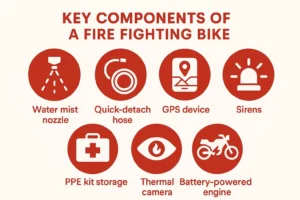
Real-World Application: Use-Case Snapshot
- Bangalore Smart City: Deployed fire bikes during festival crowd gatherings
- Mumbai Slum Rescue Program: Fire bikes used as first responder patrol units
- Industrial Zones in Gujarat: Compact bikes used for fire watch and compliance readiness
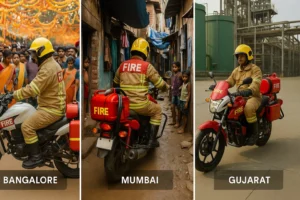
Conclusion
Fire Fighting Bikes are not just innovations — they’re necessities in today’s urban and underserved areas. Their unique ability to blend into smart city infrastructure, perform in challenging environments like slums, and offer flexible deployment makes them one of the most effective tools in modern firefighting.If you’re planning a fire safety strategy, fire bikes deserve a front-row spot in your plan.




